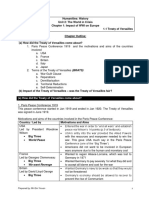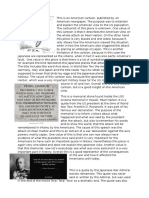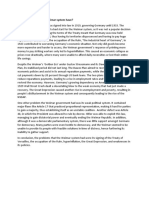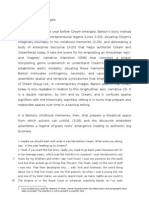The Causes of Totalitarianism
The Causes of Totalitarianism
Uploaded by
api-361841375Copyright:
Available Formats
The Causes of Totalitarianism
The Causes of Totalitarianism
Uploaded by
api-361841375Original Title
Copyright
Available Formats
Share this document
Did you find this document useful?
Is this content inappropriate?
Copyright:
Available Formats
The Causes of Totalitarianism
The Causes of Totalitarianism
Uploaded by
api-361841375Copyright:
Available Formats
The causes of totalitarianism
Historical, social and economic causes
Andrea Altomare - Edin Trebovic 26 May 2017
HISTORICAL AND SOCIAL CAUSES
The following points contributed to the rise of totalitarianism in Europe between
1929-39:
The humiliating treatment meted out to Germany by the Treaty of Versailles. It
created a sense of hate and revenge among the Germans. The Treaty had mutilated
Germany phisically, It humiliated her emotionally, It suffocated her economically and
encircled her territorially. This has greatly offended the sense of nation of this state.
Furthermore the Weimar republic estabished after the First World War didn't succeded to
improve the bad situation in Germany, and It was also severely affected by the Great
Depression (1929). Hitler fully exploited these sentiments to establish his dictatorship in
German.
Secondly, the Treaty of
Versailles greatly disappointed
Italy. Though she fought on the
side of the winners, She couldn't
get whatever had been promised to
her during the war. In fact the
italian state didn't obtain as the
allies said, some territory in the
Dalmatian peninsula. (In
particulary, the president of United
States of America, Thomas
Woodrow Wilson, didn't allow
Italy to annex these territories). In
THE CAUSES OF TOTALITARIANISM 1
the other hand Italy had to face poverty, discontent and general disorder. In these years
(1921), was founded by Benito Mussolini the Fascist National Party.
The Italian leaders felt that though They had won the war, They lost the peace.
Naturally, the Italians were in the look out for a man who could help them to achieve their
national ambitions, and they found in Benito Mussolini the right person to did this. This
climate of uncertainty permitted him to establish his totalitarian regine in Italy. In
addiction, we have to say that he didn' obtain the consensus only for these reasons, but
also for his personality and his character. Like the italian writer Elsa Morante asserts in
one of her diary page dated the 1st May 1945 (The day of Mussolini's shooting): the italian
people are guilty of the establishment of this regime, in fact a lot of them promote, and
encourage the leader of the Fascist Party. Moreover, He obtain a large consensus because
he reflects the italian people, in particular his mediocrity, his ignorance and his vulgarity
were some characteristics common to many italians.
In addition to the particular cause which helped the growth of totalitarian regimes in
various countries, there were some general causes which also contributed to the rise of
dictatorships:
In the first place, the democratic governments established after the First World War
proved a miserable failure in so far as they failed to solve the social, economic and
political problems facing their countries in the post-war period. Their failure was fully
exploited to establish dictatorial regimes.
Finally, the failure of the League of Nations to check
aggression and preserve world peace also greatly
contributed to the rise of totalitarian regimes. Japan,
Italy, Germany etc. committed aggression with
impunity and the League of Nations failed to take any
action against them.
THE CAUSES OF TOTALITARIANISM 2
ECONOMIC CAUSES
Nazism
By 1914 Germany had become Europes most powerful economic and military
power, and it was second only to the United States in the world. Four long, terrible years
of warfare meant that, by 1918, Germanys economy was in ruins.
The effects of defeat
Warfare meant that Germany could not import or export industrial goods and to
have severely limited trade. Resources and food were diverted to the war. As a result of
the war, by 1919 Germany was no longer the second most economically advanced nation
in the world.
The terms of the Treaty of
Versailles ordered that
Germany had to pay huge
sums in reparations to the
Allies. In 1921, as Germany
could not pay, French and
Belgian troops invaded and
occupied the Ruhr to take
goods and raw materials.
During 1923 Germany printed more money to pay striking workers. Hyperinflation
resulted, wiping out the value of savings.
The 'Golden Years'?
The years 1924 to 1929 became known as the 'Golden Years' Germany became
increasingly prosperous and peaceful. The USA lent Germany huge sums of money. The
economy was rebuilt, unemployment was reduced and people began to feel secure.
Collapse
The collapse of the American economy after the Wall Street Crash during the
autumn of 1929 had terrible consequences all over Europe. Between 1929 and 1933 there
was high unemployment and severe poverty in Germany.
THE CAUSES OF TOTALITARIANISM 3
Communism
In 1916, three-quarters of the Russian population was comprised of peasants who
lived and farmed in small villages. Most of them were serfs who were owned and could
be traded by their landowners.
The state of agriculture in central Russia was poor, using techniques deeply out of
date and with little hope of improving thanks to widespread illiteracy and no capital to
invest.
Families lived just above the subsistence level, and around 50% had a member who
had left the village to find other work, often in towns. As the central Russian population
boomed, land became scarce. Their life was in sharp contrast to the rich landowners, who
held 20% of the land in large estates and were often members of the Russian upper class.
In central Russia the peasant population was rising and land was running out, so
eyes were on the elites who were forcing the debt ridden peasants to sell land for
commercial use. Ever more peasants travelled in search of
work: to the cities. There they became urbanised and looked
negatively on the peasants left behind. Cities were highly
overcrowded, unplanned, poorly paid, dangerous and
unregulated.
As the urban culture was forming, new workers looked
negatively at their bosses and elites, so they started to prefer
socialists instead of liberals.
People like Vladimir Lenin took the control by getting
people trust, so two revolution took place in 1917 (in february and in october) in Russia.
SOURCES
http://users.metu.edu.it.tr/e160798/essay2.pdf
http://academic.mu.edu/meissnerd/russian-rev.htm
https://www.quora.com/What-caused-the-rise-of-fascism-in-the-early-20th-century
History book: "MilleDuemila. Un mondo al plurale" written by Valerio Castronovo
THE CAUSES OF TOTALITARIANISM 4
You might also like
- SOP-Issue, Receipt & Return of Explosive From MagazineDocument5 pagesSOP-Issue, Receipt & Return of Explosive From Magazinemanoj100% (1)
- A Look at The Turtle TradingDocument12 pagesA Look at The Turtle Tradingdascore100% (1)
- WWII Essential QuestionsDocument8 pagesWWII Essential QuestionsKJHNo ratings yet
- Origins of The Vietnam War Part FiveDocument3 pagesOrigins of The Vietnam War Part FiveNick Shepley100% (1)
- 1.1 TOV NotesDocument4 pages1.1 TOV NotesAyex MorgenNo ratings yet
- Chap 4 - Political Impact 2013Document42 pagesChap 4 - Political Impact 2013Glenn WongNo ratings yet
- Wwii: Origins and Consequence SDocument41 pagesWwii: Origins and Consequence SmartinshehzadNo ratings yet
- History Higher Level FA-7 Rap On The Vietnam War Abhinav Tripathi Tuesday, 22 December 2020Document2 pagesHistory Higher Level FA-7 Rap On The Vietnam War Abhinav Tripathi Tuesday, 22 December 2020Abhinav k.tNo ratings yet
- Southeast Asia's Pacific WarDocument8 pagesSoutheast Asia's Pacific WarThe Wilson CenterNo ratings yet
- Nazi Foreign Policy Source AnalysisDocument9 pagesNazi Foreign Policy Source AnalysisThepower BearBG100% (1)
- SRJC H2 Hist 9752 P1Document8 pagesSRJC H2 Hist 9752 P1MaverickNo ratings yet
- Q2 League of NationsDocument12 pagesQ2 League of NationsSmita ChandraNo ratings yet
- Ed Igcse VietnamDocument19 pagesEd Igcse Vietnamdiyanav1047No ratings yet
- Day 1 LessonsvietnamDocument15 pagesDay 1 Lessonsvietnamapi-315425483No ratings yet
- CHPT 6 Part 2Document39 pagesCHPT 6 Part 2Glenn WongNo ratings yet
- Digital Unit Plan TemplateDocument5 pagesDigital Unit Plan Templateapi-287737671No ratings yet
- David Low Stepping StonesDocument1 pageDavid Low Stepping StonesRaghav AgarwalNo ratings yet
- Appeasement DocumentsDocument4 pagesAppeasement Documentsapi-295914646No ratings yet
- Unit Plan Overview RedoDocument8 pagesUnit Plan Overview Redoapi-284206426No ratings yet
- Vietnam Think-Tac-ToeDocument2 pagesVietnam Think-Tac-Toeapi-263170775No ratings yet
- Reasons Germany's Defeat in WWII (Updated Original)Document63 pagesReasons Germany's Defeat in WWII (Updated Original)Maddie BeeNo ratings yet
- A Level AQA HIS2LThe Impact of Stalins LeadershipDocument108 pagesA Level AQA HIS2LThe Impact of Stalins Leadershipannabelle gonzalezNo ratings yet
- Chapter 11 A World in FlamesDocument6 pagesChapter 11 A World in FlamesJames AndersonNo ratings yet
- Mariel DepaudhonDocument18 pagesMariel DepaudhonMariel DepaudhonNo ratings yet
- Germany Revision BookletDocument26 pagesGermany Revision Bookletkasumi.chiyoru100% (1)
- Appeasement WorksheetDocument1 pageAppeasement WorksheetSchannasp8100% (1)
- Paris Peace Treaties 1919-1922: Consequences of WWIDocument49 pagesParis Peace Treaties 1919-1922: Consequences of WWIJayla-jade AdamsNo ratings yet
- Cold War Revision NotesDocument10 pagesCold War Revision Notesemily.folorunshoNo ratings yet
- Rise of HitlerDocument10 pagesRise of HitlerClaudia ChangNo ratings yet
- Paper 3 Content and Practice Q Revision BookletDocument10 pagesPaper 3 Content and Practice Q Revision BookletnicholasNo ratings yet
- Daily Blog The Cold WarDocument2 pagesDaily Blog The Cold WarPRIYANSHU SHARMANo ratings yet
- Chapter 1Document10 pagesChapter 1Smita ChandraNo ratings yet
- Japanese Fascism RevisitedDocument20 pagesJapanese Fascism RevisitedJason ScribnerNo ratings yet
- Cold War DebunkedDocument2 pagesCold War Debunkednaldspirit69No ratings yet
- IB History Beginning of Cold WarDocument6 pagesIB History Beginning of Cold Warsprtsfrk4evr100% (1)
- Opcvl Paragraphs HumanitiesDocument4 pagesOpcvl Paragraphs Humanitiesapi-304764759100% (1)
- Paper 2 Revision GuideDocument25 pagesPaper 2 Revision Guideapi-344379991No ratings yet
- More Critical Questions On Cold War CleanDocument4 pagesMore Critical Questions On Cold War CleanSuinNo ratings yet
- 1a) Comparing Two SourcesDocument3 pages1a) Comparing Two SourcesAndrei PrunilaNo ratings yet
- Rmany 2018 3 1933 1938Document48 pagesRmany 2018 3 1933 1938MarcellNo ratings yet
- Geneva AgreementDocument29 pagesGeneva AgreementLinhLingNo ratings yet
- Who Was Responsible For The Development of The Cold WarDocument1 pageWho Was Responsible For The Development of The Cold Warapi-298737611No ratings yet
- 3.1 Rise of Hitler NotesDocument3 pages3.1 Rise of Hitler NotesAyex MorgenNo ratings yet
- Untitled PresentationDocument18 pagesUntitled Presentationapi-206999897No ratings yet
- Ib Essay Planning Grid BlankDocument2 pagesIb Essay Planning Grid Blankapi-298737611No ratings yet
- IB History Internal Assessment (IA)Document10 pagesIB History Internal Assessment (IA)Jonathan Ma100% (1)
- CH 33 Sec 2 - Communists Take Power in ChinaDocument4 pagesCH 33 Sec 2 - Communists Take Power in ChinaMrEHsieh100% (2)
- Essay Planning DetenteDocument2 pagesEssay Planning Detenteapi-298737611100% (1)
- Cold War FlashcardsDocument52 pagesCold War FlashcardsnicholasNo ratings yet
- Digital Unit Plan TemplateDocument3 pagesDigital Unit Plan Templateapi-269190975No ratings yet
- The Korean War & Cuban Missile CrisisDocument4 pagesThe Korean War & Cuban Missile CrisisDHRUV STEPHAN PINTONo ratings yet
- IB History - Problems With The WeimarDocument1 pageIB History - Problems With The WeimarChouu A.R.M.YNo ratings yet
- Women Nazi GermanyDocument2 pagesWomen Nazi GermanySusi MeierNo ratings yet
- Nazi GermanyDocument6 pagesNazi GermanyMithunSheregarNo ratings yet
- Analysing The Reasons For The End of The Cold WarDocument4 pagesAnalysing The Reasons For The End of The Cold Warapi-298737611No ratings yet
- Appeasement Factcheet 2Document3 pagesAppeasement Factcheet 2api-314957723No ratings yet
- Wwii Scrapbook ProjectDocument9 pagesWwii Scrapbook Projectapi-375514076No ratings yet
- Daily Life Under The Japanese Occupation Part IIIDocument42 pagesDaily Life Under The Japanese Occupation Part IIIGlenn WongNo ratings yet
- Interwar PeriodDocument8 pagesInterwar Periodantoniodemora100% (2)
- Causes and Consequences of World WarDocument6 pagesCauses and Consequences of World Warchhavichaudhary2340No ratings yet
- Causes WwiiDocument15 pagesCauses WwiiMalik AhsanNo ratings yet
- CLF - Regional Learning ScheduleDocument137 pagesCLF - Regional Learning SchedulenizartcsNo ratings yet
- Accounting Treatment of Cash Discount 1-Cash Discount at The Point of The Sell - It Will Be Accounted For The Time ofDocument7 pagesAccounting Treatment of Cash Discount 1-Cash Discount at The Point of The Sell - It Will Be Accounted For The Time ofSandeep RayNo ratings yet
- BFD NotesDocument2 pagesBFD NotesHuzaifa AhmedNo ratings yet
- LoanDocument16 pagesLoanchasericeprivatechat456No ratings yet
- Data Mining in The Insurance Industry - Solving Business Problems Using SAS Enterprise Miner SoftwareDocument20 pagesData Mining in The Insurance Industry - Solving Business Problems Using SAS Enterprise Miner SoftwareShehan1No ratings yet
- Labor - Employee Classification - Regular, Project EesDocument14 pagesLabor - Employee Classification - Regular, Project EesewNo ratings yet
- A Study On Green Supply Chain Management Practices Among Large Global CorporationsDocument13 pagesA Study On Green Supply Chain Management Practices Among Large Global Corporationstarda76No ratings yet
- Free Trade Is Not Free - A Case For Fair TradeDocument148 pagesFree Trade Is Not Free - A Case For Fair TradeAnimesh SinghNo ratings yet
- R4 Remittance FormDocument1 pageR4 Remittance Formworldnetlink0% (1)
- Analytical Test SampleDocument17 pagesAnalytical Test Sampleguyhero60% (5)
- Client Details (Avni) (AutoRecovered)Document371 pagesClient Details (Avni) (AutoRecovered)p.dhiganNo ratings yet
- Complete Analysis of Pakistan IndustriesDocument88 pagesComplete Analysis of Pakistan IndustriesFizza KhanNo ratings yet
- Education Technology QuarterlyDocument25 pagesEducation Technology Quarterlykoweg84771No ratings yet
- China-Bangladesh TradeDocument4 pagesChina-Bangladesh TradeJahid Hasan ShaonNo ratings yet
- Drug Pricing in India Final PDFDocument4 pagesDrug Pricing in India Final PDFAnil Bhard WajNo ratings yet
- Important MCQ's of February 2020: TelegramDocument227 pagesImportant MCQ's of February 2020: TelegramRupam DattaNo ratings yet
- Analysis and Strategies For Emerging MarketsDocument3 pagesAnalysis and Strategies For Emerging MarketsMaham asif100% (1)
- Correigendum SolarDocument49 pagesCorreigendum SolarKetav PatelNo ratings yet
- 2019 PLHK - Spek Booth 2.7.19 - City NeonDocument7 pages2019 PLHK - Spek Booth 2.7.19 - City NeonEdwin KurniantoNo ratings yet
- Nepal Rastra Bank ReportDocument70 pagesNepal Rastra Bank ReportSuresh AryalNo ratings yet
- Fuel Cell Technologies WorldwideDocument8 pagesFuel Cell Technologies WorldwideVero FrancoNo ratings yet
- Family ProjectDocument20 pagesFamily ProjectpraharshithaNo ratings yet
- 161-205 Case LawDocument2 pages161-205 Case LawAsim Ahmad100% (2)
- Nasdaq Dubai Ipo GuideDocument104 pagesNasdaq Dubai Ipo GuidetamersalahNo ratings yet
- James Barton, Cream, and Creamfields: A Draft NarrativeDocument26 pagesJames Barton, Cream, and Creamfields: A Draft NarrativeDaniel HartleyNo ratings yet
- 123Document5 pages123Akshata GhorpadeNo ratings yet
- Manduleli Victor Bikitsha M0zwmqy8 ArchivedDocument6 pagesManduleli Victor Bikitsha M0zwmqy8 ArchivedManduleli BikitshaNo ratings yet
























































































